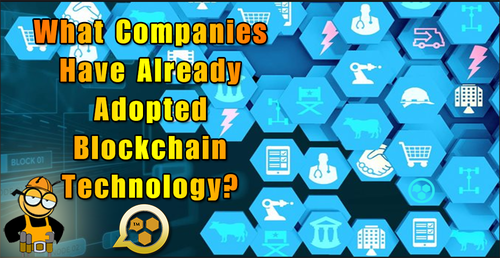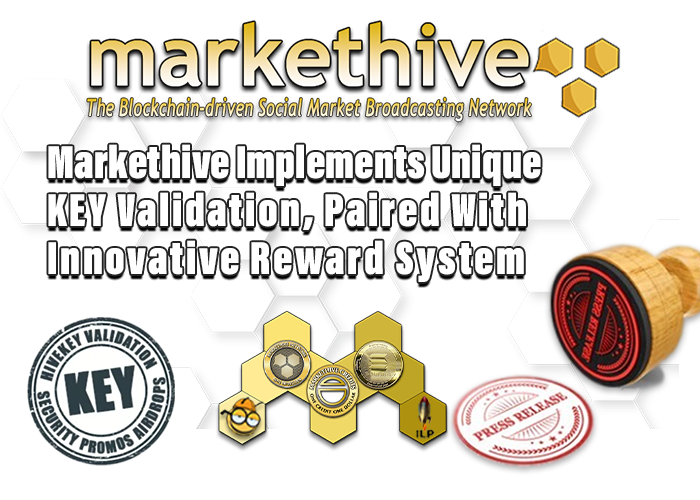
What Companies Have Already Adopted Blockchain Technology?

Over the last two years, we’ve seen a growing amount of interest and even hype towards cryptocurrencies and a new world economy. It seems that hype is now subsiding and giving way to more of a natural, organic growth of Blockchain Technology. Banking is only the beginning and now society can benefit from Blockchain Technology in many other industries. This will transform the way companies do business so ultimately the use cases for a transparent, immutable ledger of transaction data are virtually endless.
Since the blockchain is a decentralized entity, it requires no centralized supervision which makes it resistant to fraud. From logistics to real estate, digital ID management, social media and now the next-generation market network, corporations around the world are making overwhelming advances in the adoption of Blockchain Technology. Here a just a few companies that already have integrated the blockchain into their operations.
FedEx
FedEx is one of the world’s biggest logistics management companies and handles billions of dollars worth of cargo every year. FedEx has now become the first big shipping giant to incorporate Blockchain technology into their supply chain management. They are using Blockchains to track high-value cargo and are extending the functionality to almost all their shipments. In addition to that, they are also helping to develop the Blockchain-based industry standards for supply chain logistics establishing themselves as pioneers in this field.
FedEx together with two other major international delivery services firms DHL Express and UPS is a member of the Blockchain in Transport Alliance. In September of 2018, the firm joined Hyperledger, an open-source project established to improve cross-industry blockchain technologies. The collaboration will purportedly enable the company to build blockchain-based industry-grade applications, platforms and hardware systems.

Microsoft
The tech giant Microsoft has embraced Blockchain Technology since its inception. Microsoft had started accepting Bitcoin payments on its website in 2014 when almost no one had even heard of cryptocurrencies. Microsoft has also secured 40 patents related to the use of Blockchains as payment gateways and for secure storage.
Bill Gates and several of his nonprofit organizations have looked at Blockchains to try to improve their structure. Microsoft is also letting businesses and developers deploy their own Blockchain using Stratis in Microsoft Azure. Microsoft Azure is a cloud computing service created by Microsoft for building, testing, deploying, and managing applications Microsoft-managed data centers.

Burger King – Russia
In 2017, fast-food giant Burger King launched its own cryptocurrency token in Russia, called WhopperCoin on the Waves platform. Named after the brand’s flagship burger, WhopperCoin is Burger Kings’s attempt at using Blockchain to power their rewards program. What’s unique about this approach is that unlike traditional rewards programs, WhopperCoin tokens can be stored online, traded or even transferred to other people using the Waves platform. Customers would receive a WhopperCoin for every Rouble they spend at Burger King and correspondingly a Whopper could be bought for 1700 WhopperCoin.
Notably, Starbucks is working with Microsoft to develop a blockchain-based supply chain tracking system and mobile app that will allow customers to track the supply chain journey of the beans they buy and the coffee they drink. … Last year, Starbucks worked with more than 380,000 coffee farms to ensure ethical sourcing.

KIK Messenger
KIK is one of the biggest online chat platforms with over 300 million active users. KIK concluded its ICO in 2017 and had recently integrated the Kin cryptocurrency in their platform which can be used to make payments to other users of the platform. Although they have been through some trials and tribulations, they are moving forward with thanks to the Medialab acquisition. The main attraction of Kik that sets it apart from other messaging apps is its anonymity.
The Kin Foundation announced it is able to offer zero-fee transactions by using its unique network. KIN is the cryptocurrency and although blockchains are often developed by a community, some are built by companies, which can afford to cover transaction costs. Kik has managed to eliminate transaction fees in the way.

IBM
IBM is shaping up to be one of the giants in the cryptocurrency space by providing the backbone of Blockchain-related services to businesses. Using the Hyperledger Blockchain creator tool, they can help the organizations to create their own distributed ledger and smart contract systems. They have already partnered with some businesses that deal with logistics to increase efficiency and lower costs for them.
The partners include logistics giants like Walmart and banks like the Bank of Montreal (BMO), CaixaBank, Commerzbank, Erste Group, and the United Bank of Switzerland (UBS). With food logistics as in the case of Walmart, the goal is to make the supply chain more secure so that contamination can be reduced. While the banks have come to develop a Blockchain trade finance platform called Batavia.
Walmart
Walmart and nine other food companies have partnered with IBM to create a Blockchain for tracking food globally through its supply chain. Real-time data will be captured at every point, on every single food product. The Food Trust Blockchain, which includes Nestlé SA, Dole Food Co., Unilever, and several others.
These companies have been collaborating with IBM on the initiative since 2016 and began conducting trials of the product in August of last year. Their goal is to improve the companies’ ability to identify issues involved with food recalls, such as tracing outbreaks more quickly to limit customer risk. Walmart appears to have joined the initiative after the outbreak of salmonella in the supply chain last year.

Overstock.com
Overstock has been one of the biggest advocates of Blockchain Technology from the beginning and lets users purchase all the items on their website using Bitcoin. The company sells home decor, furniture, bedding, and many other goods that are closeout merchandise.
Patrick M. Byrne, the founder of the company, is a staunch supporter of cryptocurrencies and has been outspoken about his commitment to decentralized currency. Byrne has made it quite clear that he wants to run a blockchain business, not a retailer. The company has made some moves into blockchain over the past few years.
It launched the Medici Ventures investing firm to focus on blockchain technology, a public digital ledger of transactions, and has also developed its own tZero security tokens for e-commerce and trading. Since then, Byrne has stepped down as CEO of Overstock and president of Medici Ventures Jonathon Johnson has taken over. Johnson has been very instrumental in getting the company heavily invested in the blockchain business.

Huawei Technologies
Huawei has rolled out its global blockchain which is a Cloud Blockchain where enterprises can develop, deploy and manage blockchain applications. Being one of the top manufacturers of mobile phones, they also want to use the Blockchain to create a better user experience and systemize the mobile industry further to reduce fraud and trickery.
Huawei claimed in a recent press release that, “Blockchain Technology offers mobile carriers superb opportunities to support the transformation of business models through new network layers, which can revolutionize how data integrity is verified and value and rights are transmitted and tracked over the infrastructure to subscribers.”

Social Media And Blockchain
As the blockchain market evolves there is an increased interest from the social media giant, Facebook. Not sure how simple it will be to integrate a genuine blockchain, given they have 2 billion+ users which would mean scalability on a massive level. There’s also the key issue of the way it monetizes the personal data of its users. That actually threatens the privacy and user sovereignty that is crucial for blockchain. Twitter has also expressed an interest in the blockchain.
In a distributed ecosystem, built on a blockchain, the power lies with the people. In other words, there cannot be one singular entity with controlling powers over the rest of the network. This, among other things, protects against corruption and manipulation from the centralized entity. It also restores power to the community as a whole.
People are looking to migrate to better solutions for the sake of privacy and security alone. So while Facebook is looking for a way to implement blockchain into its network, others have already integrated blockchain technology at conception, making it a whole lot easier.
Blockchain Alternatives
Currently, so-called Social Media platforms on the blockchain are mainly blogging platforms, like Steemit and Yours.org. Steemit pays its users to contribute by writing or curating content. In the case of Yours.org, the community pays to view the articles that are posted by the writer. This can range from $0.10 to a few dollars depending on how much the writer believes the readers will be willing to pay to view it.
Both Yours and Steemit have an upvoting system that also pays. You can earn Bitcoin SV with Yours.org if you create value, and Steemit pays in their three native digital currencies: SteemPower, Steem Dollars, and Steem, which can then be converted into BTC or other cryptos on 3rd party exchanges.
Minds.com is an open-source platform for content with encrypted messaging facilities built on the blockchain and has a growing user base that allows anyone to speak their mind and boost their content using its tokens. A free open internet is their goal and they are prepared to take all steps necessary to protect the users' rights.

Market Network and Social Media Combined
Markethive is a decentralized Market Network integrated with a social media interface with collaboration being a fundamental characteristic. Built on the blockchain with its own coin (MHV) is setting the pace of a new era in how we communicate and do business online.
State-of-the-art integrated inbound marketing platform, social network, blogging platform, eCommerce business services, ewallet, coin exchange, mining datacenter, faucet lead portals, Loyalty & Bounty programs and News Media & Content Publisher for success in the crypto-preneurial and entrepreneurial markets.
Markethive pays you MHV coin in the form of micropayments for every activity you execute on the platform. It’s not limited to creative blogging. You can tip members instead of likes which in turn earns more coin. At the moment you also receive 500 coins for just signing up as a free member. There are many more incentives to be part of this growing network including the Loyalty Program which will pay you dividends from the company’s net profits as Markethive continues to establish itself. Markethive is the first social/market network on the blockchain.
Markethive’s mission and objective are to pioneer “Universal Income” worldwide. To empower the novice through to the seasoned entrepreneur.

Social Networks Were The Last 10 Years. Market Networks Will Be The Next 10.
First, we had communication networks, like telephones and email. Then we had social networks, like Facebook and LinkedIn. Although it has been said Facebook has become a surveillance network masquerading as a social network.
It’s just a matter of time until nearly all independent professionals and their clients will conduct business through collaborative Market Networks and have a massive positive impact on how millions of people work and live, and how hundreds of millions of people buy and sell better services. Also be able to impart any and all information through blog casting without fear of being banned or spied upon, along with creating relationships of value and integrity.
Conclusion
Investments in blockchain startups are one of the indicators of the rise in the growth of the blockchain market. 2017 showed the potential for blockchain growth with a little over $1 billion in cryptocurrency investments. In 2018, there was a further increase in blockchain and cryptocurrency investments. This resulted in a cool $3.9 billion through venture ca[ital investments.
2017 has been described as the year of blockchain tourism, while 2018 was all about experimenting and testing blockchain technology. The time has come now for more companies to utilize it. As illustrated in this article we see many different industries adopting blockchain technology and because blockchain has numerous uses we will see a lot more companies integrating and using this technology to solve real-world issues.

Deb Williams
A Crypto/Blockchain enthusiast and a strong advocate for technology, progress, and freedom of speech. I embrace "change" with a passion and my purpose in life is to help people understand, accept and move forward with enthusiasm to achieve their goals.
TP





